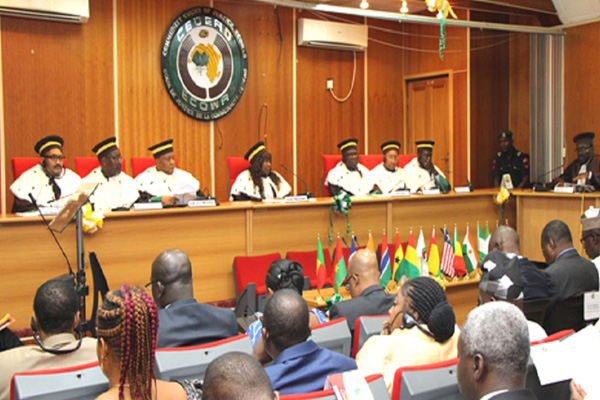The ECOWAS Court of Justice has ordered Nigeria to amend part of its Cybercrime Act to conform with some international laws the country has ratified.
The West Africa regional Court delivered its ruling on March 25 stating that Nigeria’s Cybercrime Act must be consistent with the African Charter on Human and Peoples’ Rights (ACHPR) and the International Covenant on Civil and Political Rights (ICCPR).
Justice Keikura Bangura who read the decision of the Court said Section 24 of the Cybercrime Act, which focuses on prohibition and prevention among other areas, is not in tandem with Article 9 of the ACHPR and Article 19 of the ICCPR.
The Court’s judgement follows a case filed by Socio-Economic Rights and Accountability Project (SERAP), a non-governmental organisation.
SERAP in their suit said Section 24 was vaguely worded, ambiguous and illegal. The NGO said the interpretation and repressive use of the Section by the State violated the rights to freedom of expression, information and other rights of human rights defenders, activists, bloggers, journalists, broadcasters and social media users.
It said, in particular, the Nigerian government and its agents have used provisions of the Act to harass, intimidate, arbitrarily arrest and detain and unfairly prosecute, human rights defenders, activists, journalists, broadcasters and bloggers and social media users who express their views perceived to be critical of the Government both at the Federal and State levels.
SERAP in the suit stated 12 cases of alleged victims of harassment, intimidation, arrest unlawful detention, prosecution and imprisonment of journalists, broadcasters. Some of the victims also included human rights defenders and activists, bloggers, social media users. These victims, according to the suit, had been abused by the Nigerian federal government and its agents and several States of Nigeria between August 2015 and November 2018, for alleged cyberstalking. SERAP, therefore, urged the Court to make declarations and orders that will highlight the incompatibility of the Act with the provisions of the ACHPR and ICCPR.
The Nigerian government in its defence said the Act was not enacted to muzzle the freedom of expression in Nigeria but to curtail the activities of criminals carried out on the internet. It, therefore, urged the Court to dismiss the suit on the grounds that it was misplaced and unproven and the reliefs SERAP was seeking were not grantable in law.
The State further indicated that there was an application on the same case before its national court seeking the same reliefs and that the interpretation of Section 24 of the Act must be submitted to domestic courts and not the ECOWAS Court as this is not within its jurisdiction.
The Nigerian government maintained that the Cybercrime Act was in line with Section 45 of the country’s 1999 Constitution and was subjected to the requisite constitutional and legal processes. It added that SERAP was aware of the process leading to the passage of the Act but did not protest the passage.
In the Court ruling, it addressed Nigeria’s defence that the interpretation of Section 25 was not within its competence. The Court said it had in a plethora of decided cases upheld that mere allegation of human rights violation is sufficient to invoke its human rights mandate pursuant to Article 9 (4) of the Supplementary Protocol. It said as long as the two requirements of accessing the Court has been met that is, it was not anonymous and that the case was not before another international court.
The Court dismissed the claim by SERAP on the list of the 12 cases of alleged victims of harassment, intimidation, arrest unlawful detention, prosecution and said the organisation had failed to provide evidence on the violations suffered by those listed. The Court also dismissed SERAP’s claim for compensation and ordered both parties to bear their costs.
The MFWA welcomes the Court’s ruling and urges the Nigerian government to take immediate steps to amend the Cybercrime Act 2005 to conform to provisions in the ACHPR and ICCPR to ensure the protection and enjoyment of freedom of expression rights on the internet.





